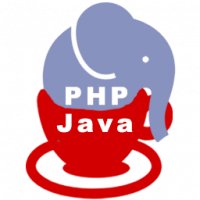Comparing PHP and Java

PHP and Java are both languages ranked in the Top 10 in the TIOBE index. In this article, we compare the two languages.
Interpreted and Compiled
PHP is an interpreted language. The Zend Engine that is bundled with the PHP distribution is a scripting engine that interprets PHP scripts as a user has developed them. The Zend Engine internally compiles the PHP scripts into Zend opcodes or instruction machine code. The Zend Engine is also the runtime engine, and it runs the compiled code. Compiling PHP scripts is transparent to the user, and the user does not directly perform any compilation. Java is a compiled language. First, the Java source code has to be compiled into bytecode, and subsequently, the bytecode is run on the Java Virtual Machine (JVM). While an interpreted language has the benefit of not requiring the intermediate compilation, a compiled language has the advantage of being able to perform compile-time performance optimizations.
Scripting Language and Programming Language
PHP is designed to be a scripting language. Java is designed to be a programming language. A scripting language is typically interpreted instead of being compiled, and a programming language is typically compiled (interpreted/compiled comparison is made in the preceding section). However, that is not the main difference between the two. The main difference is that a scripting language is used for automating tasks with scripts, while a programming language is used for developing applications that implement algorithms by using a set of instructions. Another salient difference between programming and scripting languages is that the former are typically strongly typed, and the latter are weakly typed. The strong and weak comparison is discussed in a later section. A scripting language is a special-purpose programming language.
Desktop and Server-Side Support
Java is used on the server-side, and the Java programming language is not designed to be used on the client-side in a browser. However, some web frameworks based on Java are available for developing browser-based graphical user interfaces (GUIs). Java also provides some packages (Java Foundation Classes/Swing) and Abstract Window Toolkit (AWT) API to develop GUI desktop applications. PHP is also designed mainly for server-side scripting, and the scripting output may be displayed in a browser. PHP does not have built-in support for desktop applications. Some PHP-based web frameworks are available for developing browser-based user interfaces.
Weakly Typed and Strongly Typed
PHP is a weakly typed language by default with the provision for strict typing. Weak typing implies that a user or script developer does not set the variable type, but instead, the type is decided by the PHP runtime based on the context in which a variable is used.
Type declarations in PHP 7 (called Type Hints in PHP 5) allow declaring function parameter types. PHP 7 also added support for return type declarations, which implies that types may also be used as return types in a function. PHP 5.x supported only class/interface types, self, array, and callable as types. PHP 7.x added support for scalar types (bool, float, int, string), iterable, and object as types. PHP 7 scalar type declarations could be coercive (default) or strict. Type declarations and return type declarations using scalar types are made strict by adding a declare(strict_types=1); directive at the top of a file. In coercive mode, an incorrect argument type or return value type is converted into the specified type at runtime. Only conversion among scalar types can be performed.
With strict typing, the argument type or the return value type must be the same as declared or a TypeError exception is thrown. In PHP 7 using strict typing, a TypeError exception is thrown if an argument passed in a function call is not of the type declared in the function definition or if the value returned is not the return type as defined in the function.
Java is a strongly typed language with support for class and interface types, arrays, and primitive data types (int, byte, short, char, long, double, float, boolean). At compile time, every variable must be associated with a type. Type inferencing in Java 10 and later versions allows declaring a variable without an explicit type by using the var keyword. The Java compiler infers the type from the context in which the variable is used. The main advantage of strong data typing is compile-time type checking, which reduces the likelihood of runtime errors. The main benefit of a weakly typed language is the flexibility it allows in declaring and calling functions.
Both Are Object-Oriented
Both PHP and Java are object-oriented languages with support for inheritance. Both PHP and Java provide the class and interface constructs. Java supports the Object class type at the top of the class hierarchy. Instances of any class are also instances of the Object class. PHP does not have any such base class, but PHP supports object as a data type. In both PHP and Java, a class may extend only one other class, and an interface may extend one or more other interfaces. Java supports nested classes in that a Java class may contain other classes. A proposal for nested classes was made in PHP but was withdrawn.
Stay tuned next article where we will discuss the main differences between PHP and JavaScript.

